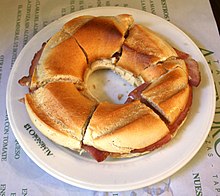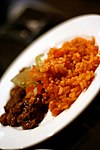Rosca
 Rosca from Madrid, Spain | |
| Alternative names | Ka'ake |
|---|---|
| Type | Bread, bagel, doughnut |
| Region or state | Mexico, South America, and other areas |
| Created by | Spanish and Portuguese |
| Main ingredients | Flour, salt, sugar, butter, yeast, water, and seasonings |
Rosca (ring or bagel) is a Spanish and Portuguese[1] bread dish eaten in Mexico, South America, and other areas. It is made with flour, salt, sugar, butter, yeast, water, and seasonings. It is also called ka'ake and referred to as a "Syrian-style cracker ring".[2]
Roscas de reyes variation[]
Roscas de reyes (ring of kings or three King's bread) is eaten on "El Dia de Los Reyes" ("The Day of the Kings"), which is part of the celebration of the Three Kings who visited the baby Jesus to give him gifts (traditionally gold, myrrh, and incense).[3]
The cake itself is an oversized version of kingcake colored with candy fruit. Raisins, milk, anise, cinnamon, vanilla, and colorful candy fruit are used depending on the recipe.[4][5]
At least one plastic miniature figurine of the baby Jesus can be hidden inside the cake. The person who finds it is seen as the lucky winner of the prize (whatever that might be).[5] In many traditions, the person who finds a plastic baby first must host a dinner party, and anyone who finds another plastic baby must bring a dish. The dinner party is hosted on 2 February, which is called "Dia de la Virgen de la Cadelaria" ("Day of the Virgin of Cadelaria"). After eating the rosca, the children leave their shoes near the doorstep so they can receive a small gift.[citation needed]
Gallery[]

Roscas of Chile

A Mexican rosca de reyes
Roscas "chonchinas" from Chonchi (Chiloé, Chile)

Bodegón, sandía, bread, roscas and copa, in a painting by Luis Egidio Meléndez in 1770
See also[]
- List of breakfast foods
- List of doughnut varieties
References[]
- ^ Retrieved from https://books.google.com/books?id=qn-DASgdhiAC&pg=PA43&dq=rosca+dough&lr=#v=onepage&q=rosca%20dough&f=false.
- ^ Glezer, Maggie (2004). A blessing of bread: the many rich traditions of Jewish bread baking around the world. Artisan Books, 2004. ISBN 978-1-57965-210-4, page 187. Retrieved from https://books.google.com/books?id=jAkqFgvrkWUC&pg=PA187&dq=rosca+dough#v=onepage&q=&f=false.
- ^ Clark, Bryanna (1990-11). Festive Holiday Breads. Vegetarian Times, November 1990, page 32. Retrieved from https://books.google.com/books?id=eggAAAAAMBAJ&pg=PA32&dq=rosca+dough#v=onepage&q=rosca%20dough&f=false.
- ^ Virginia Nylander Ebinger Aguinaldos: Christmas customs, music, and foods of the Spanish-speaking countries of the Americas Sunstone Press, 2008 ISBN 978-0-86534-689-5, page 234.
- ^ Jump up to: a b Beth Hensperger Beth Hensperger's bread made easy: a baker's first bread book Ten Speed Press, 2000 ISBN 978-1-58008-112-2, page 84
Bibliography[]
External links[]
| Wikimedia Commons has media related to Rosca. |
- A State Mandated Christmas Bonus, a blog post by the Law Library of Congress, makes reference to the Rosca de reyes.
- Mexican breads
- South American cuisine
- Mexican cuisine stubs














